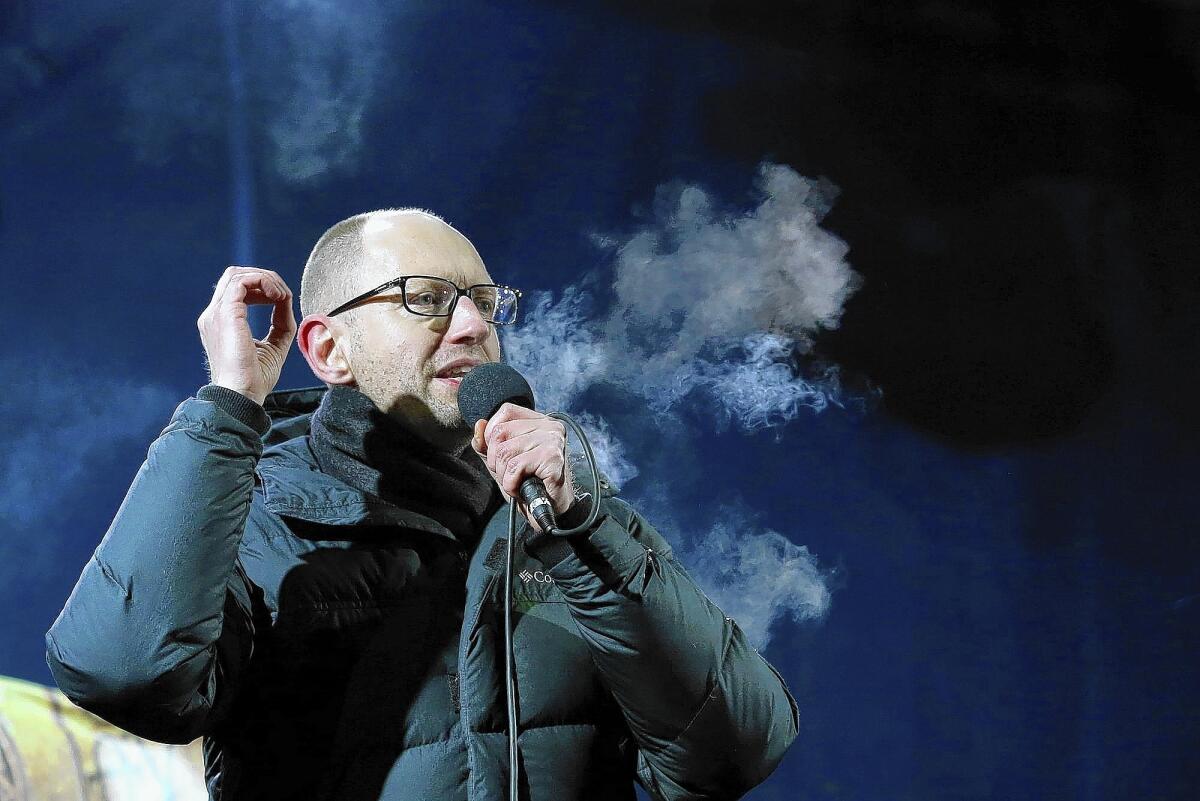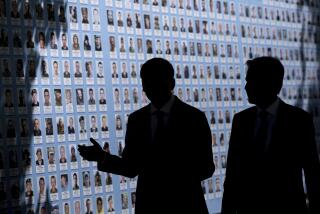Ukraine’s fugitive president turns up in Russia

MOSCOW — Ukraine’s fugitive president turned up in Russia on Thursday and masked gunmen seized government buildings in the Crimean region as tension built over the direction of the country’s revolution.
The day’s developments left Russia trying to maintain a delicate balance between assuring the West that it would not intervene and members of Ukraine’s Russian-speaking minority that it would seek to protect their rights.
5:55 a.m.UPDATE:
Russian marines are blocking a Ukraine coast guard unit in Sevastopol. About 30 gunmen surrounded the unit Friday morning, the UNIAN news agency reported. The coast guard officers identified the gunmen as Russian marines from Brigade 810 of the Black Sea Fleet, the report said. Meanwhile, Russian snipers were deployed on hilltops nearby. Later Friday, Russian Navy Capt. Alexander Tolmachyov arrived and demanded that none of the coast guard officers leave the base. Tolmachyov said his troops were fulfilling the demands of the Crimea regional Security Council to prevent the capture of weapons by extremists, UNIAN reported.
U.S. officials urged restraint. Secretary of State John F. Kerry said he had been reassured by Russian Foreign Minister Sergei Lavrov that Moscow “will respect the territorial integrity of Ukraine.” In Brussels, Defense Secretary Chuck Hagel cautioned against provocative actions that could spin out of control, creating a conflict no one wants.
Reflecting the sensitivity of the moment, Russia said nothing officially about the whereabouts of Ukrainian President Viktor Yanukovich or the seizure of the buildings in Simferopol, the capital of Crimea in southern Ukraine, by Russian-speaking gunmen. The Russian Foreign Ministry vowed that Moscow “will have a firm and uncompromising response to violations of the rights of compatriots by foreign states,” the Itar-Tass news agency said.
Yanukovich issued a statement that was read on Russian state-controlled television and carried by three news agencies with close Kremlin ties in which he proclaimed he still was the legitimate ruler of Ukraine. He said he was in danger from “extremist” elements running Ukraine after a three-month uprising drove him to flee his homeland a week ago.
“I have to ask Russia to ensure my personal safety from extremists,” Yanukovich said in the typed statement shown on Russia-24 television. The news agencies — Interfax, Itar-Tass and RIA Novosti — shortly thereafter quoted an unidentified Russian official as saying that Yanukovich’s appeal for asylum had been “satisfied on the territory of Russia.”
Russia Today television reported that Yanukovich, who is wanted on a Ukrainian Interior Ministry warrant alleging culpability in mass murder for last week’s crackdown that killed at least 82 protesters and police officers, would appear at a news conference Friday afternoon in the southern Russian provincial city of Rostov-on-Don, near the Ukrainian border.
It was unclear where Yanukovich was staying. Reports in Western and Russian media variously said he was at a hotel in Rostov-on-Don, at a Kremlin sanatorium near Moscow or at the Russian Black Sea naval base in Sevastopol.
“Everything that is happening now in the [parliament] of Ukraine is illegitimate,” Yanukovich said of the interim Ukrainian government voted in by opposition lawmakers Thursday, RIA Novosti reported. “All decisions will quickly show their ineffectiveness and will not be fulfilled.”
The tumult that has engulfed Ukraine since late November was triggered when Yanukovich refused to sign an association agreement with the European Union that would have boosted trade ties with the Western bloc and opened a path to eventual membership. Instead, he opted for closer economic ties with Moscow.
In Kiev, the Ukrainian parliament, now dominated by the opposition leaders whose protests led to a EU-brokered agreement to end bloodshed and hold early elections, on Thursday approved a slate of new government ministers.
Former foreign minister, economist and opposition leader Arseny Yatsenyuk was chosen as interim prime minister to guide the unsteady and indebted country to a presidential election May 25 and a new legislative vote in the summer.
Yatsenyuk, 39, said late Wednesday when his nomination was announced that stability would be the government’s first priority: With state finances on the brink of collapse, Ukraine needs to assure the international lenders whose help it needs.
He charged that the former government had plundered the country’s finances and siphoned off about $70 billion to private offshore accounts since Yanukovich came to power in 2010. During the last three years, Yatsenyuk said, Ukraine’s gold and hard currency reserves had plunged to $15 billion from $37 billion.
Ukraine “is on the verge of economic and political collapse, as they want to tear up the country,” Yatsenyuk said in a speech to the parliament shortly before the appointment. “And only we are capable of preserving the integrity of the Ukrainian state in the interests of the Ukrainian people.”
Russian President Vladimir Putin on Wednesday called “immediate and thorough” drills to test his military’s combat readiness. Other Russian officials said the move was a routine exercise, but it rattled nerves in Kiev and the West.
Russian fighter jets flew sorties near the Ukrainian border and armored personnel carriers were seen outside Russian bases in Crimea, prompting Ukraine’s acting president, Oleksandr Turchynov, to warn Moscow that its troops should stay on bases or their actions “will be considered a military aggression.” Turchynov also called the occupation of the Crimean parliament and government buildings in Simferopol “a crime against the government of Ukraine.”
Yatsenyuk said Ukrainian police forces had been deployed around the occupied buildings to ensure there was no escalation of tensions that could endanger the population.
The gunmen, clad in camouflage and masks and reportedly armed with Kalashnikov assault rifles and grenade launchers, called themselves “the protectors of the Russian people of Crimea.” Russia has a lease on a base for its Black Sea Fleet in Crimea, and the region has many pro-Russia people.
The armed men rejected an offer of talks with the new Kiev government, raised Russian national flags over the two buildings and allowed lawmakers in for a session of the regional parliament, which is dominated by Yanukovich loyalists and pro-Moscow figures. The lawmakers passed a resolution calling for a May 25 referendum on the future status of Crimea, the same date set for Ukraine’s presidential vote.
The referendum would be about “expanding the autonomy of the region,” according to a statement that offered no specifics. Crimea’s government chief had said earlier that any such vote would have no more than “symbolic” significance.
Kerry, in an appearance at the State Department with German Foreign Minister Frank-Walter Steinmeier, said the Russian military exercises that began near Ukraine were previously scheduled and were “not related to the Ukraine.”
He said U.S. officials were appealing to the leaders of Ukraine’s interim government to reduce tension with the pro-Russian east of the country.
Hagel, speaking after a meeting of North Atlantic Treaty Organization defense ministers in Brussels, said, “These are times for cool, wise leadership on Russia’s side and everyone’s side.”
“I expect Russia to be transparent about these activities,” he said, “and I urge them not to take any steps that could be misinterpreted, or lead to miscalculation during a very delicate time.”
Williams reported from Moscow and Loiko from Kiev. Times staff writers Paul Richter in Washington and David S. Cloud in Brussels contributed to this report.
More to Read
Sign up for Essential California
The most important California stories and recommendations in your inbox every morning.
You may occasionally receive promotional content from the Los Angeles Times.











